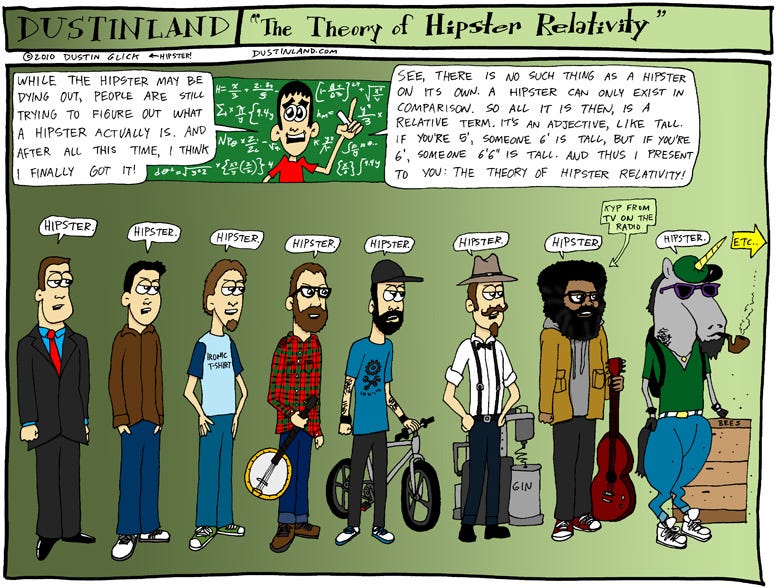“I am not sure that I exist, actually. I am all the writers that I have read, all the people that I have met, all the women that I have loved; all the cities I have visited.”
— Jorge Luis Borges
I just finished reading R. Jay Magill Jr.’s Sincerity. It’s a look back at a hundreds of years old tension between authenticity, performative authenticity and taking the piss out of those performers. In it, Magill winds up in a modern place that many of us would recognize — a world where irony is overwrought but caring about something is considered saccharine or maudlin.
It’s the same problem that David Foster Wallace worried about. Modern culture (for DFW, television in particular) is great at ironically lampooning the culture norms of previous generations. Social rules and norms, both spoken and unspoken, get skewered by satirists, caricature, 4th wall breaks or self-referential humor.
And in many ways, that’s a good thing. We resist putting anyone or anything up on a pedestal, so in theory, we’re less likely to be swept away by predatory forces. We’re more conscious of what we say and how we say it, ensuring that more people have the ability to participate in and share culture.
But it’s also left us cold and cynical in many ways. We celebrate feel-good stories on social media of a child sharing a sandwich with a hungry classmate, but we balk at adults who invest themselves in social good over commercial good. We’re excited to try farm grown, locally sourced vegetables, but might chuckle if someone we knew moved to the country to start a small farm.
What if we all endeavored to care a little more in daily life? Be a little more sincere about what matters to us and damn the snide looks from the cynics?
I started with a quote from Jorge Borges, one of my favorite authors. At its core is an idea that Matthew Crawford explores in The World Beyond Your Head.
Crawford references a scientific study in which young mice were not allowed to orient themselves in their environment. They were spun in a moving tube when they were young, so they never developed a sense of direction or space. The researchers found that without that environmental grounding when young, a mouse will never acclimate. Similar studies have found the same thing about social skills. An animal, or even human, that isn’t socialized as a baby, will have a much more difficult time learning those skills later in life and may never catch up.
That means we are inextricably tied to the world around us. The people, places and things we live among help form the core of who we are as individuals. It goes against our Western idea of the independent detached self, but it’s right there in the research. As the Beatles said, “I am he As you are he As you are me And we are all together.” And then something about a Walrus…
Knowing that we’re fundamentally tied to everything around us should give us permission to care about those things. Permission to care about the people in our lives and the people we’ll never meet. Permission to care about the quality and outcomes of the work we do. Permission to like some things and dislike others (for me, it’s bourbon and pineapple respectively — positions my wife vehemently disagrees with. And that’s OK!).
We literally can’t be the cool, impersonal loners that ironic culture would suggest because that person can’t exist. Even in the parodying of popular norms or the intentional avoidance of the mainstream, cultures will develop around people sincerely expressing themselves. We see it most in the development of the word “hipster”, which lets me share my favorite graphic of all time.

So care, earnestly and often. Look people in the eye and express those things that are meaningful to you. I regularly share my professional commitment to the principles of Servant Leadership, and while some people might be surprised at my sincerity, no one has ever questioned that it’s worth believing in.
Keep ironic detachment and cynicism in its place. It’s fine for a laugh occasionally and good to keep around for when egos get inflated. But like cookies or ice cream, it’s a sometimes food — not a regular diet.
When people come to together to express their sincere commitments to one another, we form communities. When we only poke and prod at the ideas that could unite us, we’re left alone and bitter.
Commit to caring. Give yourself permission to learn, grow and love every day. You are the product of the world around you. It’s OK to care about it.